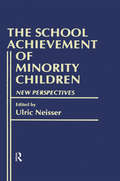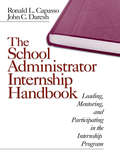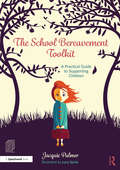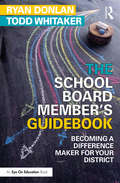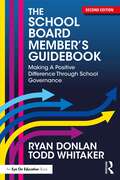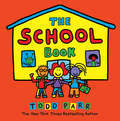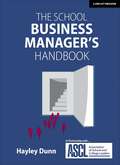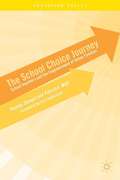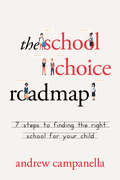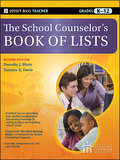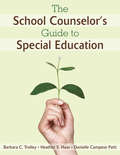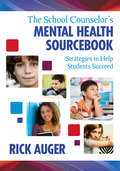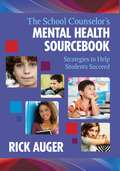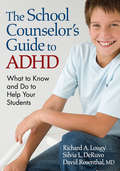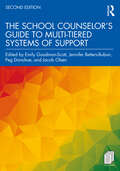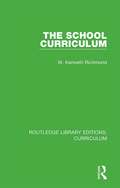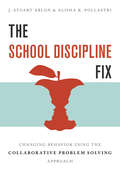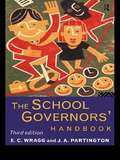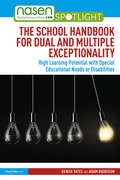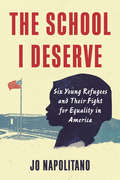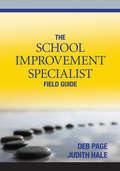- Table View
- List View
The School
by Henry Viscardi Jr.The true story of a man who opened a K-12 school for children with physical disabilities in the early 1960s. Describes the accomplishments of the children, many of whom had seldom been out of their homes. The book also describes the opposition and discrimination the school's founders faced when the local residents decided they didn't want the school to be built in their neighborhood
The School Achievement of Minority Children: New Perspectives
by Ulric NeisserLower school achievement of minority children is usually explained by projecting "deficits" upon the children -- deficits that are attributed to genetic or environmental causes. In contrast with tradition, the contributors to this book demonstrate how group differences in academic accomplishment and test scores are affected by cultural factors and standard educational practices as well.
The School Administrator Internship Handbook: Leading, Mentoring, and Participating in the Internship Program
by John C. Daresh Ronald L. CapassoCapasso and Daresh offer a hands-on guide to creating and implementing a program that can turn preservice administrators into transformational leaders
The School Bereavement Toolkit: A Practical Guide to Supporting Children
by Jacquie PalmerPractical and accessible, this guidebook is designed to help staff in schools support bereaved children in their care. Providing information and guidance on practical issues around bereavement and indicating some of the issues that might require extra thought or assistance, this book makes accessing relevant information as easy and quick as possible.When busy school staff are faced with a bereaved child, the prospect can be daunting. What do I say? What can I do? Will I make it worse? Have I got time to do this? This book is a toolbox to give staff confidence in helping bereaved young people. Information is easily accessed and simple to use, giving staff quick and practical help. There are sections on what will help and what will not; also included are photocopiable worksheets and tools to aid children and young people to explore their grief, as well as information on how school communities can share the news and manage an initial response.With age-appropriate guidance to help school staff working in both primary and secondary settings, this key guide provides quick-to-access information for those not trained in child bereavement to help individual children or whole classes following a loss.
The School Board Member's Guidebook: Becoming a Difference Maker for Your District
by Todd Whitaker Ryan DonlanEvery student deserves a high-impact, well-qualified, and governance-driven school board. In this helpful book, best-selling authors Ryan Donlan and Todd Whitaker show you as a school board member how to make smart, worthwhile decisions that will lead to positive change in your district. The School Board Member’s Guidebook addresses the challenges of making realistic choices that will truly benefit the school and have a lasting impact. Topics include: How to work and communicate effectively with the superintendent during the year; How to find common ground with colleagues; How to represent the interests and needs of the community at large; How to keep your constituencies focused and informed through strategic planning and structured committee participation; How to host constructive and cordial school board meetings; How to capitalize on individual talents and strengths; And more! Each chapter offers strategies, tips, and sample scenarios. With these resources and the practical advice throughout the book, you’ll be able to make a lasting difference in the lives of every student in your district. You’ll be a Difference Maker.
The School Board Member's Guidebook: Making A Positive Difference Through School Governance
by Todd Whitaker Ryan DonlanEvery student deserves a high-impact, well-qualified, and governance-driven school board. In this helpful book, best-selling authors Ryan Donlan and Todd Whitaker show you as a school board member how to make smart, worthwhile decisions that will lead to positive change in your district.The School Board Member’s Guidebook addresses the challenges of making realistic choices that will truly benefit the school and have a lasting impact. Topics include: how to work and communicate effectively with the superintendent during the year how to rise above contentious issues, while still showing you care about people’s viewpoints how to represent the interests and needs of the community at large how to keep your constituencies focused and informed through strategic planning and structured committee participation how to host constructive and cordial school board meetings Each chapter offers strategies, tips, and sample scenarios. In addition, this timely second edition features a new chapter on the roles and challenges of the board president. With the resources and the practical advice throughout the book, you’ll be able to make a lasting difference in the lives of every student in your district.
The School Book
by Todd ParrBeloved and New York Times bestselling author Todd Parr uses his signature blend of playfulness and sensitivity to introduce readers to all the wonderful things they can do at school, where everyone is welcome!With his trademark bright colors and bold lines, Todd Parr introduces readers to a perennial source of childhood anxiety and excitement both: school! From morning routines to meeting new people to learning and playing together, Todd explores all the different things that can happen in school, all the while sharing a cheerful, child-friendly message of sharing, inclusion, and community. Welcome to school-- a place for everyone to grow!
The School Business Manager's Handbook
by Hayley DunnThis book brings together guidance, advice and tips from school business leaders across the sector. Demonstrating the importance of being an outward-facing leader, who knows their value and can clearly communicate their impact. Wherever you are in your career, this book will provide you with practical advice on how to thrive in your role, deal with difficult situations, develop your career, create positive collaborative relationships that will improve your role, your school and most importantly the outcomes for the young people you serve. School business leaders are without doubt unsung heroes in education and this book will empower you to be the best version of yourself.
The School Business Manager's Handbook
by Hayley DunnThis book brings together guidance, advice and tips from school business leaders across the sector. Demonstrating the importance of being an outward-facing leader, who knows their value and can clearly communicate their impact. Wherever you are in your career, this book will provide you with practical advice on how to thrive in your role, deal with difficult situations, develop your career, create positive collaborative relationships that will improve your role, your school and most importantly the outcomes for the young people you serve. School business leaders are without doubt unsung heroes in education and this book will empower you to be the best version of yourself.
The School Choice Journey
by Thomas Stewart Patrick J. WolfThis in-depth chronicle of 110 families in Washington, DC's Opportunity Scholarship Program provides a realistic look at how urban families experience the process of using school choice vouchers and transform from government clients to consumers of education and active citizens.
The School Choice Roadmap: 7 Steps to Finding the Right School for Your Child
by Andrew CampanellaYou want your children to benefit from a great education. But every student is unique. One type of school might be a great fit for your neighbor's child, but it might not work for your son or daughter.Across the country, many parents today have more choices for their children's education than ever before. If you are starting the process of finding your child's first school—or if you want to choose a new learning environment—The School Choice Roadmap is for you.This first-of-its-kind book offers a practical, jargon-free overview of school choice policies, from public school open enrollment to private school scholarships and more. It breaks down the similarities and differences between traditional public schools, public charter schools, public magnet schools, online public schools, private schools, and homeschooling.Most importantly, The School Choice Roadmap offers a seven-step process that will help you harness the power of your own intuition—and your own expertise about your child's uniqueness—to help you find a school that reflects your family's goals, values, and priorities. Filled with sage advice from dozens of other parents who have pursued the school search process, and interviews with school leaders and teachers, The School Choice Roadmap is an optimistic, empowering book that cuts through the confusion in K-12 education—so that you can give your children every opportunity to succeed in school and in life.
The School Counselor's Book of Lists
by Tamara E. Davis Dorothy J. Blum Ed.D.An updated edition of an essential go-to resource for school counselorsSince 1997 The School Counselor's Book of Lists has offered counselors a wealth of relevant and much-needed information written in concise and user-friendly language. A quick, easy guide for finding information on almost any topic pertinent to school counselors, the book covers everything from writing student assessments and dealing with school crises to setting budgets and running effective meetings. In order to address the transformed role of school counselors, the contents of this comprehensive second edition map to the American School Counselor Association's National Model for Counseling Programs.Includes hundreds of helpful lists offering guidelines, strategies, trends, and resourcesOfficially endorsed by the American School Counselor Association (ASCA)The first edition was a bestselling title for school counselorsAddresses the pressing issues faced by today's school counselorsThis revised edition is appropriate for school counseling graduate programs as well as to practitioners in the K-12 field.
The School Counselor's Guide to Special Education
by Dr Barbara C. Trolley Heather S. Haas Danielle Campese PattiThis hands-on guide clarifies the school counselor's role in special education and answers questions about meeting the academic, social, and career needs of students with disabilities.
The School Counselor's Mental Health Sourcebook: Strategies to Help Students Succeed
by Richard W. AugerThis unique handbook provides information on common mental health disorders and intervention strategies that busy school counselors need to help students succeed.
The School Counselor's Mental Health Sourcebook: Strategies to Help Students Succeed
by Rick AugerThe American School Counselor Association (ASCA) National Model urges school counselors to know every student and broaden their knowledge of mental health disorders. With more students in need of mental health services than ever before, the timing is ideal for a guide that equips staff to meet these challenges. The School Counselor's Mental Health Sourcebook provides tools for keeping students on track, including:Methods for addressing many disorders, including anxiety, autism, and other disruptive behavior disordersIntervention strategies that workEffective ways to collaborate with families from various culturesThe impact of culture and race on a child's mental healthCommunicating with teachers and families about students' needsRick Auger describes the disorders and strategies with a balance of simplicity and clinical depth. This time-saving resource gives busy school counselors strategies for helping students succeed in school and in life.
The School Counselor’s Guide to ADHD: What to Know and Do to Help Your Students
by David Rosenthal Richard A. Lougy Silvia L. DeRuvoCovers current information on causes, symptoms, and medications for ADHD, as well as the school counselor's role in providing interventions, collaborating with teachers, and communicating with parents.
The School Counselor’s Guide to Multi-Tiered Systems of Support
by Emily Goodman-Scott Jennifer Betters-Bubon Peg Donohue Jacob OlsenThe revision of this innovative book provides school counseling students, practitioners, leaders, supervisors, and faculty with information and resources regarding the alignment and implementation of school counseling, specifically comprehensive school counseling programs. Complementing and expanding upon the audience’s knowledge and implementation of CSCPs such as the ASCA 2019 National Model, chapters include a strong theoretical and research base as well as related practical examples from the field—including case studies of practicing school counselors, and relevant, hands-on resources and tools to assist school counselors facilitate MTSS. New topics such as culturally sustaining and antiracist practice are woven into the chapters, in addition to covering the response to the COVID-19 pandemic, mental health crises, and capturing timely and current practices in K-12 education and school counseling. Innovative, unique, and including a plethora of useful tools and resources, this guide to MTSS and school counseling is ideal for graduate students and current school counselors in the field.
The School Curriculum (Routledge Library Editions: Curriculum #30)
by W. Kenneth RichmondOriginally published in 1971. All education systems tend to be traditional and conservative. In times of rapid social change, the work of the schools becomes increasingly outdated by events. Continuous adaptation of the curriculum (which includes content, method and organization) can no longer be left to haphazard, piecemeal innovations-it must be managed. In a comparative study of the strategies adopted to date in the U.S.A., England, Scotland and France, this book points out that-although considerable reforms have been effected in these countries during the past ten to fifteen years-no adequate curriculum theory has yet been developed. The author also turns his attention to the phenomenon which he considered symptomatic of inherent failures in the education system: the drop-outs and hippies He concludes that notions about 'learning' must be revised and rather than a place in which formal instruction is given, the school of the future should be conceived as a resources-for-learning centre.
The School Discipline Fix: Changing Behavior Using The Collaborative Problem Solving Approach
by J. Stuart Ablon Alisha R. PollastriA complete guide to a paradigm-shifting model of school discipline. Disruptive students need problem-solving skills, not punishment. Traditional school discipline is ineffective and often damaging, relying heavily on punishments and motivational procedures aimed at giving students the incentive to behave better. There is a better way. Dr. Ablon and his co-author Dr. Pollastri have been working with schools throughout the world to refine the Collaborative Problem-Solving (CPS) approach, creating a step-by-step program for educators based on the recognition—from research in neuroscience—that challenging classroom behaviors are due to a deficit of skill, not will. This book provides everything needed to implement the program, including reproducible assessment tools to pinpoint skill deficits in areas like frustration tolerance and flexibility that are at the root of students' challenging behaviors. Whether you are a teacher, counselor, coach, or administrator, the CPS approach to school discipline will provide you with a new mindset, an assessment process, and an effective intervention plan for each of your challenging students. You will walk away with strategies that are immediately actionable with the students in your life.
The School Governors' Handbook
by E. C. Wragg J A Partington J. A. Partington Prof E WraggThe pace of change in education has continued to accelerate since the 1988 Education Act, and even experienced school governors are often bewildered about their duties and responsibilities, as well as what is actually happening in primary and secondary classrooms nowadays. What do school governors do? How can they manage their role most effectively? The School Governors Handbook has been the most definitive and widely read book on the subject since it was first published in 1980. Written by Ted Wragg and John Partington, two of the most respected experts in the field, one of its' great strengths has always been its mixture of up-to-date authoritative information and humour. In this third edition, all sections of the book have been substantially revised to take account of the many changes in governors' duties that have been brought about by recent legislation. As governors rarely receive any specific training for their important role, this book is an essential guide to the legal and practical aspects of governorship. Sections cover: * recent legislative changes in funding and school management * opting out * governors responsibilities, including budgets, staffing and drawing up whole school policies * how to run effective governors meetings * curriculum and assessment issues * school inspections * how to manage difficult situations, including child abuse, discipline, equal opportunities and pupil exclusions
The School Handbook for Dual and Multiple Exceptionality: High Learning Potential with Special Educational Needs or Disabilities (nasen spotlight)
by Denise Yates Adam BoddisonThe School Handbook for Dual and Multiple Exceptionality (DME) offers a range of practical strategies to support SENCOs, GATCOs, school leaders and governors in developing effective provision for children that have both High Learning Potential and Special Educational Needs or Disabilities. Building on the principles of child-centred provision and coproduction, it provides useful tips on developing the school workforce to better identify and meet the needs of learners with DME. Relevant for learners in primary, secondary or specialist settings, the book focuses on ways of meeting individual needs and maximising personal and academic outcomes. It includes: An explanation of what DME is and why we should care about it Practical advice and guidance for SENCOs, GATCOs and school leaders on developing the school workforce A discussion of the strategic role of governors and trustees in the context of DME Suggested approaches to ensure effective coproduction between families and professionals Case studies exploring the experiences of learners with DME Sources of ongoing support and resources from professional organisations and key influencers. This book will be beneficial to all those teachers, school leaders, SENCOs, GATCOs, governors and trustees looking to support learners by identifying and understanding DME. It recognises the central role that leaders and governors play in setting the inclusive ethos of a school and suggests ways for schools to ensure that all learners have the opportunity to meet their full potential.
The School I Deserve: Six Young Refugees and Their Fight for Equality in America
by Jo NapolitanoUncovers the key civil rights battle that immigrant children fought alongside the ACLU to ensure equal access to education within a xenophobic nation Journalist Jo Napolitano delves into the landmark case in which the School District of Lancaster, Pennsylvania, was sued for refusing to admit older, non-English speaking refugees and sending them to a high-discipline alternative school. In a legal battle that mirrors that of the Little Rock Nine and Brown v. Board of Education, 6 brave refugee students fought alongside the ACLU and Education Law Center to demand equal access. The School I Deserve illuminates the lack of support immigrant and refugee children face in our public school system and presents a hopeful future where all children can receive an equal education regardless of race, ethnicity, or their country of origin.One of the students, Khadidja Issa, fled the horrific violence in war-torn Sudan with the hope of a safer life in the United States, where she could enroll in school and eventually become a nurse. Instead, she was turned away by the School District of Lancaster before she was eventually enrolled in one of its alternative schools, a campus run by a for-profit company facing multiple abuse allegations. Napolitano follows Khadidja as she joins the lawsuit as a plaintiff in the Issa v. School District of Lancaster case, a legal battle that took place right before Donald Trump&’s presidential election, when immigrants and refugees were maligned on a national stage. The fiery week-long showdown between the ACLU and the school district was ultimately decided by a conservative judge who issued a shocking ruling with historic implications. The School I Deserve brings to light this crucial and underreported case, which paved the way to equal access to education for countless immigrants and refugees to come.
The School I'd Like: Children and Young People's Reflections on an Education for the 21st Century
by Catherine Burke Ian Grosvenor‘Wonderfully illuminated by children's essays, stories, poems, pictures and plans, this ground-breaking book offers a unique snapshot of the perceptions of today's school pupils’. -French bookstore Lavoisier www.lavoisier.fr In 2001, The Guardian launched a ground-breaking competition called ‘The School I'd Like’, in which young people were asked to imagine their ideal school. This vibrant and compelling book presents material drawn from that competition, offering a unique snapshot of perceptions of schools by those who matter most - the pupils. In 2011, The Guardian re-launched the competition and this updated 2nd edition reflects upon the next generation of reflections and summarises, through the children’s insightful commentary, what has changed over the intervening decade. The book is wonderfully illustrated by children's essays, stories, poems, pictures and plans. Placing their views in the centre of the debate, it provides an evaluation of the democratic processes involved in teaching and learning by: • identifying consistencies in children's expressions of how they wish to learn • highlighting particular sites of 'disease' in the education system today • illustrating how the built environment is experienced by today's children • posing questions about the reconstruction of teaching and learning for the twenty-first century. The School I’d Like: Revisited offers a powerful perspective on school reform and is essential reading for all those involved in education and childhood studies, including teachers, advisors, policy-makers, academics, and anyone who believes that children's voices should not be ignored.
The School Improvement Specialist Field Guide
by Judith A. Hale Debra L. PageImprove student achievement by transforming schools as an SIS expert! Deb Page and Judith Hale, SIS authorities, guide new and transitioning school improvement specialists in applying high-leverage practices that result in systemic, sustainable, schoolwide improvement. With easy-to-use tools and protocols, both in the guide and online, this book offers the voice and counsel of a trusted coach while addressing how to: Establish enduring interventions with viable tools and methods Use time-tested processes to teach 21st-century skills to educators and students alike Seamlessly align improvement practices to the updated Institute for Performance Improvement Standards Transition smoothly into the school improvement specialist role

